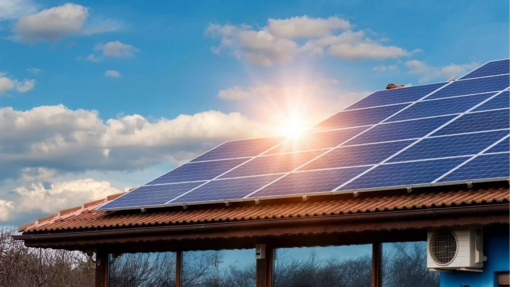Agriculture Hybrid Solar System
Grid-Connected Solar Photovoltaic System for Agricuture with Additional Battery Storage

In today’s farming landscape, rising energy costs are driving agricultural operations to explore sustainable alternatives. An agriculture hybrid solar system offers an ideal solution, combining the benefits of solar energy with the reliability of battery storage and grid connectivity. By becoming their own power producers, farmers can significantly reduce electricity expenses and ensure a stable power supply for critical operations.
While solar energy is abundant during daylight hours, its availability is limited. A hybrid solar panel system for agriculture solves this challenge by storing surplus energy generated during the day for use at night, potentially leading to significant reductions in electricity bills.
Although less common than traditional grid-tied solar systems without batteries, hybrid solar systems for farming are more costly and complex to install. Utility companies may be slow to facilitate their widespread adoption in some areas.
A grid-tied hybrid solar system for agriculture uses both battery storage and the grid as backup power sources. When solar panels generate excess energy, it is first stored in the batteries, and any additional energy is sent to the grid once the batteries are fully charged.
In the event of a grid outage, the system automatically switches to off-grid mode, drawing on stored solar energy from the batteries. This feature is especially valuable for farms located in areas prone to power disruptions, ensuring critical operations like irrigation, refrigeration, and machinery continue without interruption.
A hybrid solar energy system for farms offers numerous advantages, including energy storage for nighttime use, resilience during power outages, and a safeguard against rising electricity costs.
How Agriculture Hybrid Solar Systems Work?
An Agriculture Hybrid Solar Plant generates electricity through solar panels and stores excess energy in batteries while maintaining a connection to the grid. Here’s a step-by-step guide on how it works:
🔋 Solar PV Panels: Capture sunlight and convert it into direct current (DC) electricity.
🔄 Inverter: Converts DC electricity into alternating current (AC) to power your farm’s electrical systems, such as irrigation pumps, refrigeration, and farm machinery.
⚡ Battery Storage: Excess energy generated by the solar panels is stored in batteries, providing a reliable backup during nighttime or cloudy days.
📊 Grid Export: Once the batteries are fully charged, any surplus energy is sent back to the grid, earning you credits through net metering.
🔌 Grid Backup: Automatically pulls electricity from the grid when solar energy and battery storage are insufficient, ensuring uninterrupted power supply for your farm operations.

Benefits of Hybrid Solar Systems for Farming
Battery-Backed Reliability
Even during power outages, your battery-backed hybrid solar for farms keeps critical systems running—ideal for remote agricultural lands.
Lower Electricity Bills
A Agricultural hybrid PV system with battery can reduce monthly electricity expenses by up to 60–80%, especially for high-load operations like irrigation and refrigeration.
Eco-Friendly Farming
Hybrid solar solutions support sustainable agriculture, reducing carbon emissions and reliance on diesel generators or fossil fuel-based grid electricity.
Flexibility & Energy Security
With both battery and grid backup, you can maintain energy flow for day/night operations, cloudy days, and unexpected surges in usage.
Government Incentives & EMI Options
Get subsidies for your grid-tied hybrid solar system for agriculture and explore flexible EMI schemes tailored for rural farming businesses.
Applications of Hybrid Solar in Agricultural Sectors
Hybrid Solar System for Irrigation Pumps
Water management is critical in agriculture. A hybrid solar system for irrigation ensures uninterrupted water supply by powering submersible or surface pumps—even during load shedding or cloudy weather. This reduces diesel dependency and keeps crop cycles on track.
Cold Storage & Refrigeration Units
Perishable produce like dairy, vegetables, and fruits require constant refrigeration. A hybrid solar power system for agriculture provides backup power during blackouts, preventing spoilage and increasing product shelf life, especially in remote areas without stable grid access.
Electricity for Remote Agricultural Land
Many farms in India are situated in off-grid or low-grid-reliability regions. Hybrid solar for remote agricultural land provides complete energy autonomy, powering homes, borewells, lights, and surveillance systems around the clock.
Farm Equipment & Small Machinery
Farm tools like fodder cutters, grinding units, and milk chillers can be connected to the agriculture hybrid solar system for daytime operation using solar energy and nighttime use via battery backup, reducing operational delays and fuel costs.
Solar Hybrid Water Pumping Systems
Specialized hybrid solar water pumping systems integrate solar panels and batteries to lift and distribute water across fields, ensuring precision irrigation and saving up to 80% in recurring energy costs compared to diesel-based systems.
Greenhouse Farming
Temperature and humidity control in greenhouses is essential for high-value crops. A solar hybrid system for greenhouse farming ensures uninterrupted ventilation, heating, and lighting—powered by stored solar energy during nights and rainy days.
Key Features of Agriculture Hybrid Solar Solutions
✅ Energy Independence
Hybrid systems provide independence from the grid by storing surplus energy for later use, reducing reliance on external power sources.
✅ Battery Backup
Ensures continuous power by storing excess solar energy, which can be used during nighttime or cloudy days.
✅ Hybrid Capabilities
Integrates solar, battery storage, and grid connectivity for maximum energy reliability and flexibility.
✅ Cost-Effective
Helps reduce electricity bills by allowing you to generate and store your own power.
✅ Sustainability
By using renewable solar energy, farms can significantly reduce their carbon footprint and promote eco-friendly farming practices.
Key Considerations Before Installing a Solar Power System for Farms

Additional Considerations For Solar Power Systems
The type of solar power system you choose—especially for farms or agricultural operations—is undoubtedly a crucial decision. In addition to selecting between an agriculture hybrid solar system or a traditional setup, there are several other key factors to consider:
Solar Power System Size
The size of the system depends on your energy needs, including whether your setup is residential or a farm hybrid solar system. Factors such as load requirements, battery usage, and solar exposure will determine whether you need a small-scale system or a large hybrid solar panel system for agriculture.
Solar Panel Placement
While most panels are roof-mounted, ground-mounted solutions are common in farming environments or rural areas where rooftops may not be suitable. For farm solar hybrid system setups, ground placement can maximize exposure.
Fixed vs. Sun Tracking Arrays
Fixed arrays are cost-effective and widely used. However, sun tracking arrays can be especially beneficial for agricultural hybrid solar plants, as they improve efficiency—vital for high-demand operations like irrigation or refrigeration.
Solar Panel Material
Options include crystalline silicon, monocrystalline, polycrystalline, and thin-film. Choosing the right material for your hybrid solar energy system for farms depends on budget, durability needs, and performance under your location’s sun exposure.
Solar Power System Financing
If you’re exploring solar hybrid system financing, there are various government-backed and private loan options—especially beneficial for agricultural setups. Whether buying or leasing, financing solutions help offset the higher upfront costs of battery-backed hybrid solar for farms.
Why Choose Us for Your Agriculture Hybrid Solar System?
At Synergy Solar, we specialize in designing and installing reliable hybrid solar systems for farming that ensure uninterrupted power, even in rural or remote areas. Here’s why hundreds of farmers and agribusinesses trust us:
- Agricultural Expertise
We understand farm power needs—whether for irrigation pumps, cold storage, or machinery. Our team customizes agriculture hybrid solar solutions to match your exact load, land type, and location. - Custom Hybrid Solar Solutions
No two farms are alike. We design custom hybrid solar systems for agriculture with the perfect balance of solar generation, battery backup, and grid connectivity—ensuring you never run out of power when you need it most. - End-to-End Service
From site analysis and system design to installation and post-installation support, we handle everything. We’re not just hybrid solar system dealers for farms, we’re your long-term energy partner. - High-Quality Components
We use only tested and certified solar panels, batteries, and inverters—engineered to withstand agricultural environments and deliver long-lasting performance. - EMI & Subsidy Assistance
We simplify the process of getting financial support—helping you access solar loans, and eligible government incentives for hybrid solar systems. - Reliable Support & Maintenance
We offer ongoing system monitoring and maintenance packages to ensure your farm hybrid solar system always performs at peak efficiency.
